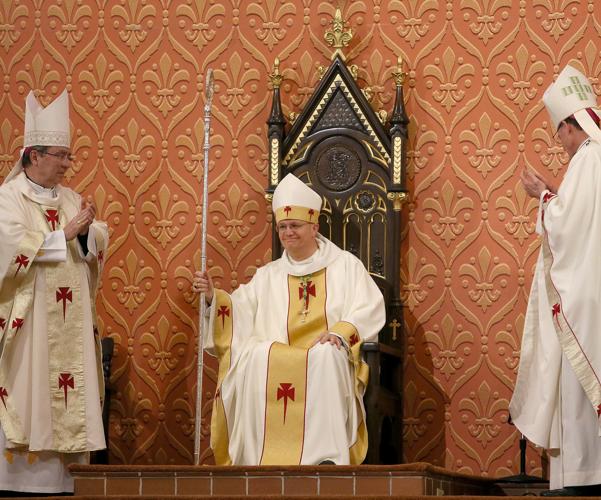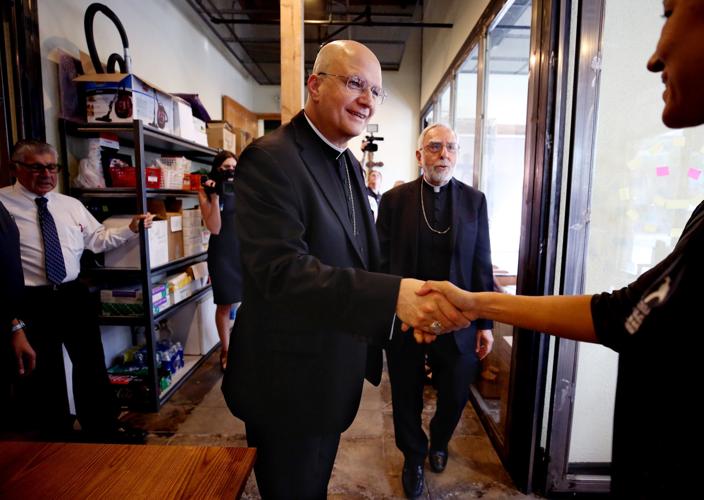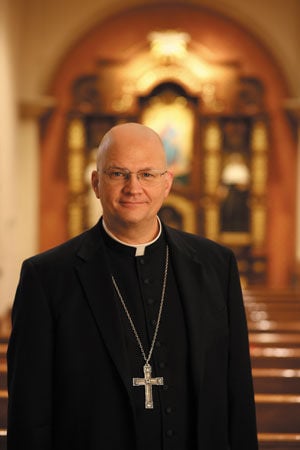Roman Catholic Diocese of Tucson Bishop Edward J. Weisenburger attracted national attention this week when he suggested “canonical penalties” for Catholics involved in separating children from families at the border.
At the spring meeting of the U.S. Conference of Catholic Bishops this week, Weisenburger lit up social media with his suggestion of punishments under church law, such as denying Communion, to Catholics who carry out that portion of the Trump administration’s “zero tolerance” policy for border enforcement.
Under the policy, recently announced by Attorney General Jeff Sessions, children and parents who cross the border illegally, as well as some seeking asylum, may be separated from each other.
The policy was denounced by many of the bishops.
During the meeting in Fort Lauderdale, Florida, Weisenburger asked whether the Catholic bishops’ conference could make recommendations for “border bishops” like himself.
“Even though what I am saying may be risky or dangerous, I think it’s important to point out that canonical penalties are there in place to heal — first and foremost to heal,” he said. “And therefore for the salvation of these people’s souls, maybe it’s time for us to look at canonical penalties.”
Catholic church laws are outlined in the Code of Canon law.
“Canonical penalties can range from denial of sacraments to excommunication, though Weisenburger did not specify what he intended beyond referring to sanctions that already exist for ‘life issues,’” Religion News Service reported.
Arizona bishops, including Weisenburger, issued a joint statement June 4 expressing a need to protect children and families seeking safety from violence through asylum by keeping them together.
Weisenburger, who is a canon lawyer, was not granting interviews about his comments Wednesday or Thursday.
In response to Weisenburger’s remarks, Bishop John Stowe of the Diocese of Lexington in Kentucky said he has spoken with a number of people who work for the Border Patrol who are “struggling in their own consciences with how do they carry out these unjust policies.”
Stowe suggested concern and pastoral care for people whose jobs call for enforcing federal border policies, and who are struggling with separating children from their families.
Plenty of people weighed in about Weisenburger’s recommendation on Twitter — one said it was a “bold move,” another called his comments “provocative.”
Critics had a lot to say, too, with one calling his comments “morally hypocritical,” and another saying border agents shouldn’t be blamed for following U.S. law.
“It is extremely rare and quite remarkable that a bishop would even raise this as a possibility in a context outside of sanctioning a pro-choice Catholic politician,” John Gehring, Catholic program director at Faith in Public Life, wrote on Twitter.
“Amazing this discussion comes up in the context of immigration when for years the bishops have studiously avoided canonical penalties for the scandal of pro-abortion Catholic politicians receiving Communion,” tweeted Kevin M. Cusick, a Catholic priest and retired Navy chaplain.
Weisenburger’s comments also grabbed headlines in a wide range of national publications, including Newsweek and the Washington Post.
Diocese of Tucson bishop emeritus Gerald F. Kicanas did not hear Weisenburger’s comments and did not attend the meeting, but told the Star on Thursday that family unity is at the core of the Catholic faith.
“It’s going to be important to raise our voice a little bit in regard to this issue of separation,” Kicanas said, stressing he was speaking for himself, and not the Tucson diocese.
“The conference (of bishops) is also concerned with the temporary protective status of Hondurans and others, which is apparently something the administration is considering lifting. That is another deep concern.”
Weisenburger has lived near the U.S.-Mexico border for less than a year. He came to Tucson in 2017 from the Midwest — Salina, Kansas. But he has an awareness of the challenges of being border bishop, Kicanas said, and will speak out because it is such an important issue for the community.
“These are issues of human dignity. Certainly there are moral dimensions to the issue,” Kicanas said. “I think there is a great deal of concern, certainly in our community and throughout the U.S., about the separation of children.”
The Tucson diocese’s episcopal vicar for Hispanic affairs said he was not aware of what Weisenburger said this week but applauds the Catholic Church in general for speaking up on the issue.
“The relationship between mother and child is sacred to us,” said the Rev. Raul Trevizo. “If you destroy that and that doesn’t mean anything, what does?”








